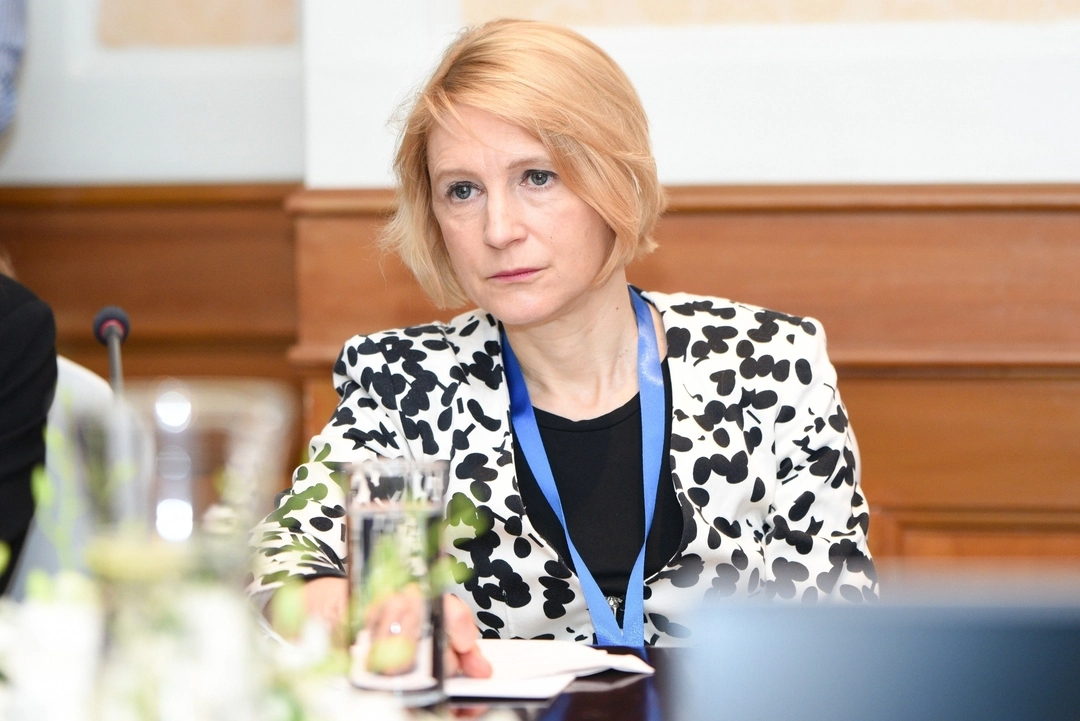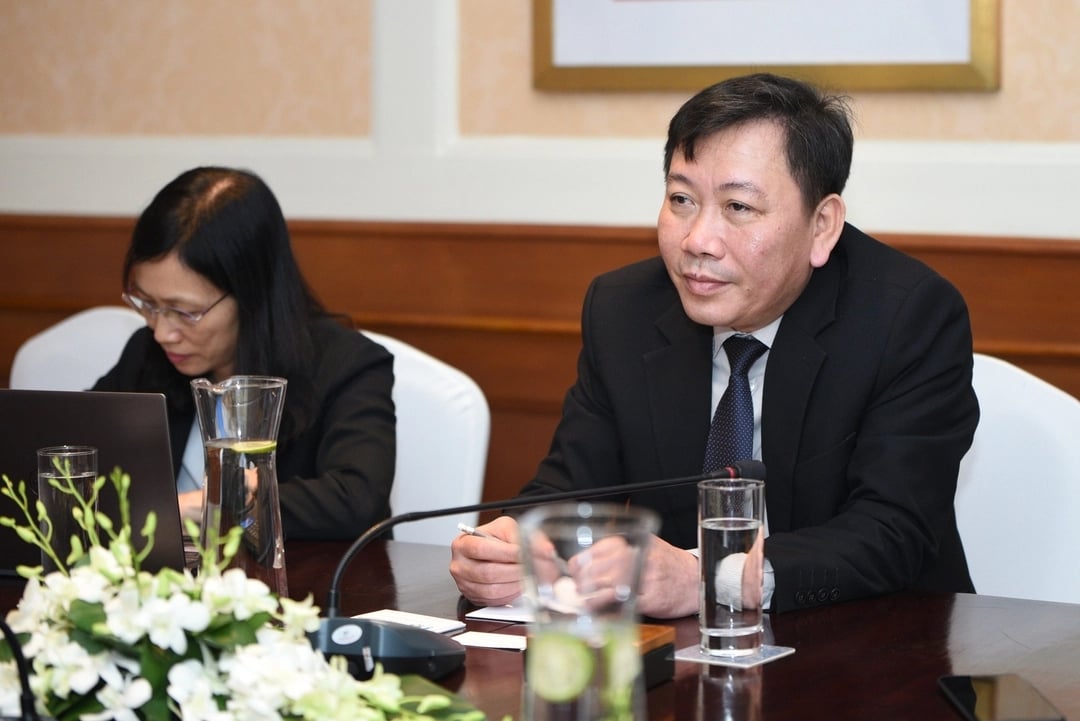June 17, 2025 | 16:56 GMT +7
June 17, 2025 | 16:56 GMT +7
Hotline: 0913.378.918
June 17, 2025 | 16:56 GMT +7
Hotline: 0913.378.918

FAO Director of Food Systems and Food Safety Division Corinna Hawkes shared her impressions to the National Action Plan to transform a transparent, responsible and sustainable food system in Vietnam by 2030. Photo: Tung Dinh.
On April 24, during the fourth Global Conference of the One Planet Network's Sustainable Food Systems Programme (SFS Programme), MARD Director of the International Cooperation Department Nguyen Do Anh Tuan talked with FAO Director of Food Systems and Food Safety Division Corinna Hawkes.
Corinna Hawkes expressed her admiration for the National Action Plan for Transforming the Food System, which aims to create a transparent, responsible and sustainable food system in Vietnam by 2030. With the MARD specifying missions and tasks for key ministries and cooperative organizations, FAO intends to learn more about the National Action Plan's next steps and how it differs from current policies and programs in existence in Vietnam.
Nguyen Do Anh Tuan, Director of ICD, stated that MARD has worked and collaborated closely with FAO and other international partners in building the food system.
"We have specific tasks for different Ministries for the National Action Plan for Transforming the Food System towards Transparency, Responsibility, and Sustainability in Vietnam, and following this Conference, we will build action plans in detail for each Ministry as well as agencies under MARD in some aspects such as policy making, research, capacity building, and piloting something new," Tuan explained.
The detailed actions for this Action Plan may take up to 6 months to create. Previously, the Ministry of Agriculture and Rural Development had many cooperation projects with international organizations such as FAO, the World Wide Fund For Nature (WWF), the World Bank... to carry out efforts on transforming the food production system through projects and programs such as the Sustainable Development of 1 million hectares of high-quality specialized rice associated with green growth in the Mekong Delta, the National Acti
Tuan stated that the Ministry would continue to promote and execute the available projects and programs, with effective management and excellent cooperation with associated parties. However, the agricultural sector is seeking FAO engagement and cooperation on critical but new issues such as ecological agriculture, malnutrition, and food loss and waste reduction.

Director of International Cooperation Department under the Ministry of Agriculture and Rural Development Nguyen Do Anh Tuan urged FAO to intervene and cooperate in three issues that the Ministry is paying attention to, namely ecological agriculture, nutrition for the poor and reduction of food loss and waste. Photo: Tung Dinh.
“We think all three of these issues are FAO's advantages. FAO is a leading organization in the field of ecology, so we want your cooperation and need your intervention to make a review of good practices that can be applied to Vietnam's diverse ecosystems", Tuan suggested.
He stated that in the following phase, the two parties may jointly investigate and explore models suitable to the ecosystems of each region of Vietnam, from north to south, including coastal areas, plains, and mountainous areas. Then, move to policy formulation, capacity-building activity execution, measurement and evaluation, and piloting.
Tuan stated that Vietnam requires a better balanced diet for the poor, particularly ethnic minority areas and women and children in vulnerable locations. The representative of the Ministry of Agriculture and Rural Development offered FAO assistance in utilizing indigenous foods to construct an appropriate nutrition for the poor in that region, particularly in hilly and remote locations where transportation is quite difficult.
The Vietnamese side need FAO assistance to research policies and pilot them in time for the issue of food diversity and nutrition for the poor.
Food waste happens at all phases of the Vietnamese food chain, from harvest to consumption. One-quarter of all food produced is lost before it reaches the processing facility or distribution hub. Total food loss in Vietnam is projected to be 8.8 million tons, or USD 3.9 billion, or around 2% of Vietnam's GDP.
Food loss, according to Mr. Tuan, is also linked to concerns such as carbon emissions and climate change. Meanwhile, capitalizing on this loss may provide significant advantages to producers while also creating new jobs in the area.
For example, Vietnam is the world's second largest coffee exporter, but we have not adequately exploited coffee by-products to encourage circular agriculture. Furthermore, food loss is caused by constraints such as a lack of storage systems, transportation, and post-harvest processing capacity. With regard to these concerns, the Ministry wishes to collaborate with FAO in order to share experiences and identify solutions.
Translated by Linh Linh
![Turning wind and rain into action: [6] ‘Four on-the-spot’ disaster management software](https://t.ex-cdn.com/nongnghiepmoitruong.vn/608w/files/news/2025/06/14/z6705183772518_8e6a71d5e2d464e10197411eb1d14b51-nongnghiep-192556.jpg)
(VAN) By simply activating the scenario on the disaster management software, the relevant authorities immediately know how many households need to be evacuated, where to evacuate them to, and by what means of transportation…

(VAN) According to the Binh Thuan Department of Industry and Trade, in the first five months of 2025, Binh Thuan's dragon fruit export turnover increased by 20.65% compared to the same period last year.

(VAN) EU countries on Thursday gave final approval to new tariffs on fertilizer imports from Russia, a move aimed at cutting off revenue that could support Moscow’s war in Ukraine, despite concerns from European farmers.

(VAN) The working delegation from the Ministry of Agriculture and Environment conducted an important trip to the Netherlands to strengthen strategic partnerships and sustainable development in the agricultural sector.

(VAN) The letter ‘A Plea from the Ocean’ not only evokes emotion but also awakens the human conscience to the responsibility of protecting life on Earth.

(VAN) The Department of Agriculture in South Africa has announced the country’s first mass vaccination of poultry to prevent local birds from contracting avian influenza.

(VAN) Establishment of the Mekong Delta Regional Agricultural Linkage Center, aiming for a closed value chain, deep processing, trading platforms, and international market connectivity.